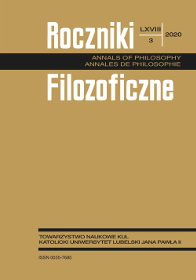Chance and Divine Providence. Methodological Notes with Pascal in the Background
Abstract
According to the author of this paper, the analytical philosophy of religion should not be closed to other spheres of culture and ignore or disregard the achievements of others, both past and contemporary philosophical currents. An analytical philosopher, including an analytical philosopher of religion, can therefore seek inspiration also outside the sphere of analytical philosophy. At the same time, this does not mean that an analytical philosopher is to disregard natural sciences or not to care about the precision of language and the right arguments. The concern for linguistic precision and the application of appropriate argumentation are crucial for the identity of the analytical philosophy. This article, taking into account the indicated metaphilosophical attitude, is devoted to a critical discussion about some of the problems raised by Professor Dariusz Łukasiewicz, in his outstanding work in the field of philosophy of religion published in Polish as Opatrzność Boża, wolność, przypadek. Studium z analitycznej filozofii religii.
References
Brentano, Franz K. “Die 25 habilitationsthesen (lateinisch und deutsch).” In Über die Zukunft der Philosophie, edited by Franz K. Brentano. Hamburg: Meiner, 1968.
Clarke, Desmond M., “Pascal’s philosophy of science.” In The Cambridge Companion to Pascal, edited by Nicolas Hammond. Cambridge: Cambridge University Press, 2003.
Harrington, Thomas M. Pascal philosophe. Une étude unitaire de la Pensée de Pascal. Paris: SEDES, 1982.
Ingarden, Roman. Controversy over the Existence of the World. Vol. 1. Translated by Arthur Szylewicz. Frankfurt am Main: Peter Lang, 2013.
Judycki, Stanisław. Bóg i inne osoby. Próba z zakresu teologii filozoficznej. Poznań: W drodze, 2010.
Khalfa, Jean. “Pascal’s theory of knowledge.” In The Cambridge Companion to Pascal, edited by Nicolas Hammond. Cambridge: Cambridge University Press, 2003.
Kleszcz, Ryszard R. O rozumie i wartościach. Łódź: Wydawnictwo WSHE, 2009.
Kleszcz, Ryszard R. “Logika, wszechmoc, Bóg.” Filo-Sofija, no. 19 (2012): 37–52.
Kleszcz, Ryszard R. “Błażeja Pascala refleksja nad poznaniem.” In Księga pamiątkowa Marianowi Przełęckiemu w darze na 90-lecie urodzin, edited by Anna Brożek and Jacek J. Jadacki, 234–52. Lublin: Norbertinum, 2014.
Kleszcz, Ryszard R. “O filozofii religii, wszechmocy Boga oraz ograniczoności naszego języka.” Filo-Sofija 15, no. 3 (2015): 199–214.
Levy, Neil. “Analytic and Continental Philosophy: Explaining the Differences.” Metaphilosophy 34, no. 3 (2003): 284–304.
Łukasiewicz, Dariusz. Opatrzność Boża, wolność, przypadek. Studium z analitycznej filozofii religii. Poznań: W drodze, 2014.
Medawar, Peter B. “Review of Teilhard de Chardin’s The Phenomenon of Man.” Mind 70 (January 1961): 99–106.
Owen, Huw P. Concepts of Deity. London, Macmillan, 1971.
Pascal, Blaise. Pascal’s Pensées. Introduction by T. S. Eliot. New York: E. P. Dutton & Co., 1958.
Plantinga, Alvin. “God and Analogy.” In The Analytic Theist. An Alvin Plantinga Reader, edited by James F. Sennett. Grand Rapids, MI: Eerdmans, 1998.
Popper, Karl R. The Logic of Scientific Discovery. London: Routledge Classics, 2002.
Sennett, James F., ed. The Analytic Theist. An Alvin Plantinga Reader. Grand Rapids, MI: Eerdmans, 1998.
Swinburne, Richard. The Coherence of Theism. Rev. ed. Oxford: Oxford University Press, 1993. First published 1977.
Trakakis, Nick. The End of Philosophy of Religion. London–New York: Continuum, 2008.
Copyright (c) 2020 Roczniki Filozoficzne

This work is licensed under a Creative Commons Attribution-NonCommercial-NoDerivatives 4.0 International License.





